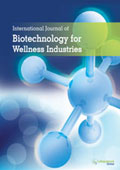|
|
Abstract: L-DOPA (L-3,4-dihydroxyphenylalanine) the precursor of neurotransmitter dopamine is used in the management of Parkinson disease and effective in controlling diabetic state. Gamma-aminobutyric acid (GABA), a non-protein amino acid is known to have many pharmacological functions and plays a major role in inhibiting neurotransmitter in brain. Whereas essential amino acids can’t synthesize in human body and it must be taken from foods to maintain good immune function. This study aims to evaluate the enrichment of mung bean with L-DOPA, GABA and essential amino acids via controlled solid state fermentation using Rhizopus strain 5351. Fermentation was carried out for a duration up to 48 h at 30 °C and the samples were analyzed at certain time intervals. The concentration of glucosamine and β-glucosidase, which indicated the growth of fungal was noted low at the early growth stage (0 to 10 h), but it was observing increased linearly within 18 to 48 h growth periods. The L-DOPA was produced after 10 h fermentation time (0.008 g/100 g dry weight, DW) and the highest yield of L-DOPA content (0.07 g/100 g DW) was attained at the fermentation time of 28 h. However, the concentration of L-DOPA was noted decreased after that. The protease activity, free and essential amino acids content also showed a drastic increment within the fermentation period of 10 to 38 h. The highest content of free and essential amino acids (FAAs and EAAs) and the protease activity of fermented mung bean were exhibited at 38 h incubation time, which were 3.74 g/100 g DW, 1.43 g/100 g DW and 18.4 U/g dry weight, respectively. The GABA content of fermented mung bean was found low (0.019 - 0.021 g/100 g DW) at early incubation time (0-10 h), however, it showed a drastic increment in the fermented mung bean after 18 h (0.132 g/100 g DW) and continuously increased until 38 h (0.198 g/100 g DW). This study showed the potential of solid state fermentation as a good strategy to enrich the fermented mung bean with L-DOPA, GABA and other beneficial bioactive compounds which play an important role to maintain good health as it helps to enhance our immune system and regulating neurotransmitter function. Keywords: L-DOPA, GABA, Mung Bean, Protease, Solid State Fermentation.Download Full Article |






